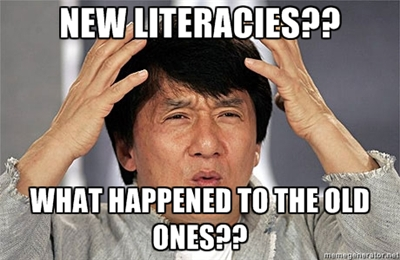Leveraging Tools, Texts, and Talk in My Teaching
According to Philip and Garcia (2013) in "The Importance of Still Teaching the iGeneration: New Technologies and the Centrality of Pedagogy," teachers can leverage texts, tools, and talks to create engaging learning spaces that incorporate digital literacies while still maintaining effective teaching methods. With the emergence of new technologies and the increasing use of these technologies in the classroom, discussions surrounding their uses have become even more prevalent among educators.
The integration of digital tools and digital literacy in the classroom, especially for younger learners like those in my 4th-grade class, poses both opportunities and tensions. With standardized testing and benchmark assessments shifting to digital platforms, there is a need for a balanced approach to the use of technology. While digital tools offer potential benefits for instruction and assessment, such as immediate feedback and engagement (Hsu & Wang, 2017), there can be an overreliance on testing data which can have an impact on students' learning experiences. For example, assessments may focus more on a student’s ability to navigate technology rather than their understanding of concepts which can lead to inaccurate results. It's important to involve teachers in the decision-making process regarding interventions based on assessment data to address these concerns. By including the insights and observations of the teachers, it increases the likelihood that students receive appropriate support fitted to their needs, rather than only relying on test scores. In addition to the impact on student learning, the use of technology in classrooms can inadvertently contribute to the over-evaluation of educators, as highlighted by Philip and Garcia (2013). While CBT technologies serve as convenient tools, they can certainly be misused data-gathering tools that exceedingly limit teacher accountability to student performance on high-stakes exams, which may not even show accurate results due to various reasons. The development of standardized testing into a metric that evaluates teachers highlights this trend, indicating a change from assessing students to evaluating educators based on student outcomes. Within the current context, which increasingly scrutinizes educators, digital tools could cause more harm than good by restricting educators rather than supporting the classroom and students.
The tension between traditional literacy and digital literacy shows the importance of finding a balance in instructional practices. While digital tools offer unique opportunities for engagement and learning, they should complement, rather than replace, traditional literacy skills. Providing students with a variety of both traditional and digital learning experiences can better support students with diverse learning preferences and promote critical thinking skills. For example, as stressed by Garcia (2017), like there's an authentic and tangible quality to live music compared to digitally created music, there's value in offering students real-world experiences in addition to digital ones. Just as some individuals connect deeply with the natural sounds of live music, there will be students who learn more effectively through traditional activities and assignments over digital ones. By acknowledging these diverse learning preferences and leveraging both traditional and digital tools, educators can create inclusive learning environments that support students' all-around development and promote critical thinking and problem-solving skills across countless contexts. It's crucial to prioritize meaningful conversations around new literacies when designing lessons and activities to support practices beyond the screen. Educators must have students participate in discussions about digital media, information literacy, and appropriate technology use. By incorporating different perspectives and real-world examples into instruction, students can develop the skills and knowledge needed to navigate the digital world purposefully and in an informed way. Educators can also provide students with opportunities for collaborative learning and peer feedback to enhance student engagement and promote a sense of ownership over their learning.
Designing instruction to support practices beyond the screen requires intentional planning and careful consideration of several factors, such as teaching principles, equity concerns, and student engagement. By addressing these considerations and tensions, educators can create inclusive and effective learning spaces that encourage students to become thoughtful and responsible digital citizens.
Garcia, A. (2017///Nov/Dec). Nondigital skills. Literacy Today, 35(3), 24-25. https://sunyempire.idm.oclc.org/login?url=https://www.proquest.com/trade-journals/nondigital-skills/docview/1966005428/se-2
Hsu, H., & Wang, S. (2017, Nov/Dec). Rethinking language learning. Literacy Today, 35(3), 28-29. https://sunyempire.idm.oclc.org/login?url=https://www.proquest.com/trade-journals/rethinking-language-learning/docview/1966005990/se-2
Martin, M. H., Romeijn-Stout, M., Beran, E., Stetson, J. Poirier, J. R., Harris, R. Breiner, N., Foglesong, A., Ching, J., Riddle, C., Davies, C. (2020). Harry Potter in the 21st Century: Leveraging Problematic Fiction to Infuse Social Justice into the LIS Curriculum. The Washington Library Association Journal, 36 (3), 27-32 https://wala.memberclicks.net/assets/Alki/Alki_December_2020.pdf
Philip, T. M., & Garcia, A. D. (2013///Summer). The Importance of Still Teaching the iGeneration: New Technologies and the Centrality of Pedagogy. Harvard Educational Review, 83(2), 300-319,400-401. https://sunyempire.idm.oclc.org/login?url=https://www.proquest.com/scholarly-journals/importance-still-teaching-igeneration-new/docview/1399327199/se-2
The Pensive Sloth. (2015, March 20). Memes for teachers [image]. The Pensive Sloth https://thepensivesloth.com/memes-for-teachers/




Comments
Post a Comment